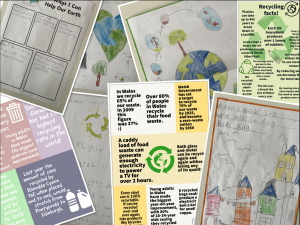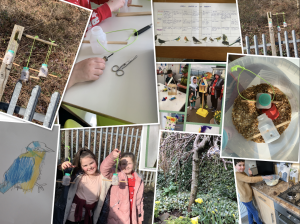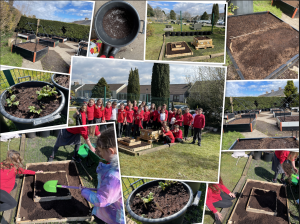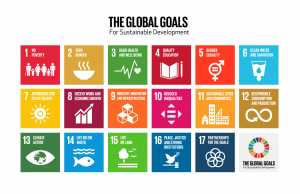 The ECO-schools programme is a learning resource. Here at Abbey Primary School pupils take key roles in decision making and participation in order to reduce the environmental impact of their school. In this way, Eco-schools extend learning beyond the classroom and develop responsible citizenship attitudes both at home and in the wider community.
The ECO-schools programme is a learning resource. Here at Abbey Primary School pupils take key roles in decision making and participation in order to reduce the environmental impact of their school. In this way, Eco-schools extend learning beyond the classroom and develop responsible citizenship attitudes both at home and in the wider community.
The Eco Schools International Green Flag, awarded to schools with high achievement in their programme, is a recognised and respected eco-label for performance in Education for Sustainable Development. The Eco-Schools programme is a long-term activity, with the award being re-assessed and renewed yearly.

The Eco-School programme in Wales covers nine interlinked topics to help schools develop a more rounded approach to Education for Sustainable Development and Global Citizenship. Find the nine Eco-schools topics that we study below.

Litter is a very visible problem. Litter causes significant damage to our wildlife and environment, the effects of which are often long-lasting and extend far beyond where the problem originates. Threats to wildlife from litter include animals becoming trapped, which can lead to starvation, mistaking litter for food, injury and food poisoning. Litter in our streets can eventually make its way into waterways and the marine environment where materials, such as plastic, break down over time but never quite disappear, creating ‘plastic oceans’ which are ingested by fish and other marine life and end up in the food chain.

Across all three sites there are litter bins for children and visitors to dispose of waste in a responsible manner. Children are encouraged to recycle, and we have recycling bins and bags on-site to recycle materials such as tin, cardboard and plastic. Our kitchen staff use food waste bags to effectively dispose of food waste after lunch time.

Waste minimisation is a set of processes and practices intended to reduce the amount of waste produced. By reducing or eliminating the generation of harmful and persistent wastes, waste minimisation supports efforts to promote a more sustainable society. Monitoring the amount of waste, while also taking steps to minimise this amount, takes time, effort and cooperation. However, having such knowledge can be really empowering and decisions can be made to bring about real difference.

Water is a crucial aspect of our lives. We use it not just for drinking and washing but also for industry, agriculture and making almost any kind of product, from burgers and tin cans to newspapers and cars. Our demand for water has grown to the point that the natural water cycle can no longer keep up. Pollution – mainly caused by sewage leaks, chemical discharges and agricultural runoff – has made clean water a rare and valuable product.

Throughout the school water consumption is reduced through the use of water efficient sanitary fittings. This helps us achieve a sustainable water economy.

We are all linked in some way to people in other parts of the world, through the products we buy, the food we eat, what we wear or watch on television, people we know or places we go on holiday. We often don’t even think about these links and the people who grow our tea or make the laces for our trainers, but increasingly the actions we take have an impact on people and the environment in other parts of the world. It is important for us to understand and consider the impact of actions when making choices, to show commitment to the sustainability of the planet and to make ethically informed choices.

At Abbey we endeavour to encourage our pupils to become responsible global citizens by incorporating Rights Respecting and Eco initiatives in our curriculum.

Everyone, schools included, has an important role to play in finding more efficient ways to manage energy and reduce carbon dioxide emissions. We can all work together to increase awareness of energy issues and change habits to improve the energy efficiency within the school and at home. Typically, the main uses for energy are heating, lighting, cooking, hot water and electrical appliances. Surveys show that through simple low-cost and no-cost measures, everyone can reduce their fuel bills significantly while also reducing their CO2 emissions. Everyone is accountable and is able to contribute to making changes to reduce energy consumption.

Abbey Primary’s new school has targeted a minimum 25% reductions in energy consumption relative to current building regulations standards by adopting the following initiatives. Natural ventilation, avoiding mechanically ventilating spaces. Glazing ratio’s, avoid over glazing which can increase heat loss in winter and overheating in summer. Daylight & room depth, limiting room depths where possible, to maximise daylight and view out. Night-time cooling, create potential for night-time cooling, by exposing thermal mass and creating secure louvered natural ventilation air paths to avoid leaving windows open at night. Fabric performance. Improving standards in air tightness and insulation.Technology. Selecting cost effective renewable technology such as Photovoltaics (solar panels).

Biodiversity is the amazing variety of all living things on our planet – from plankton, wildflowers and insects to mammals, reptiles, trees and birds. It also applies to the habitats in which these living things are to be found – oceans, woodlands, meadows and wetlands, as well as man-made places such as fields, parks and canals. Even so-called ‘wasteland’ can be a rich source of biodiversity. Biodiversity is essential because it impacts on all of our lives, both directly and indirectly. All species, including humans, require a range of basic resources to keep them alive and healthy. Humans need oxygen to breathe, water to drink, food to eat and shelter from the weather. The living things on our planet provide much of this for us, so their conservation is vital if we are to survive. Preserving planet Earth’s biodiversity is essential.


We all have a crucial role to play in promoting health and well-being. Good health and well-being not only help to avoid health problems such as obesity and heart disease, but it can also optimise day-to-day performance. Choices made regarding health and well-being can also have a direct impact on the environment, from the global impact of production of food types such as palm oil, sugar and meat products through to the choice of cleaning products used in the school. We are all responsible for shaping the attitudes and behaviours of others to ensure they adopt a healthy lifestyle.

At Abbey we help to shape the attitudes and behaviours of our pupils towards living healthy lives by initiatives such as Forest Schools, after school clubs, outdoor learning (learning through landscapes) and lead creative schools (grow, cook, eat).

Transport directly affects all life forms on this planet. The potential negative impacts of transport on the environment can be listed as degradation of air quality, greenhouse gas emissions, increased threat of global climate change, ruin of water resources, noise and habitat loss and destruction. Raising awareness about such issues should be at the forefront of everyone’s minds.

At the new school site a diverse range of transport options are promoted through the provision of cyclist’s facilities and management of car spaces and promotion of public transport. Around the new school site are pathways allowing pedestrians to move freely across the site. Also, there are drop-off zones located on-site to allow an effective traffic flow system. Furthermore, there are many car spaces available for staff and visitors.

In 2015, world leaders agreed to 17 Global Goals (officially known as the Sustainable Development Goals or SDGs). It’s now five years on, and we have more work than ever to do. These goals have the power to create a better world by 2030, by ending poverty, fighting inequality and addressing the urgency of climate change. Guided by the goals, it is now up to all of us, to work together to build a better future for everyone.
At Abbey our pupils are engaged in achieving agreed Global Goals through a range of subjects across the Curriculum to work towards creating a better world for all.